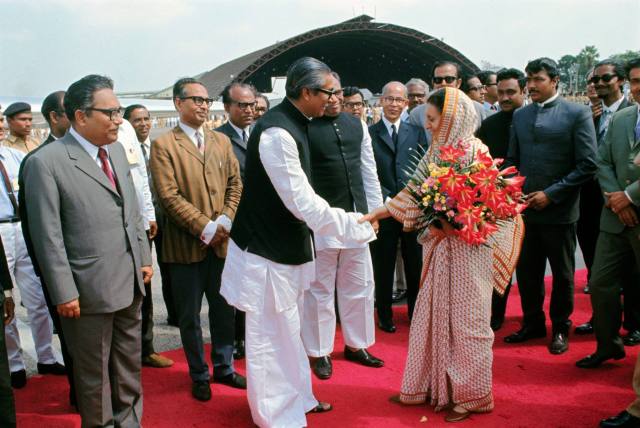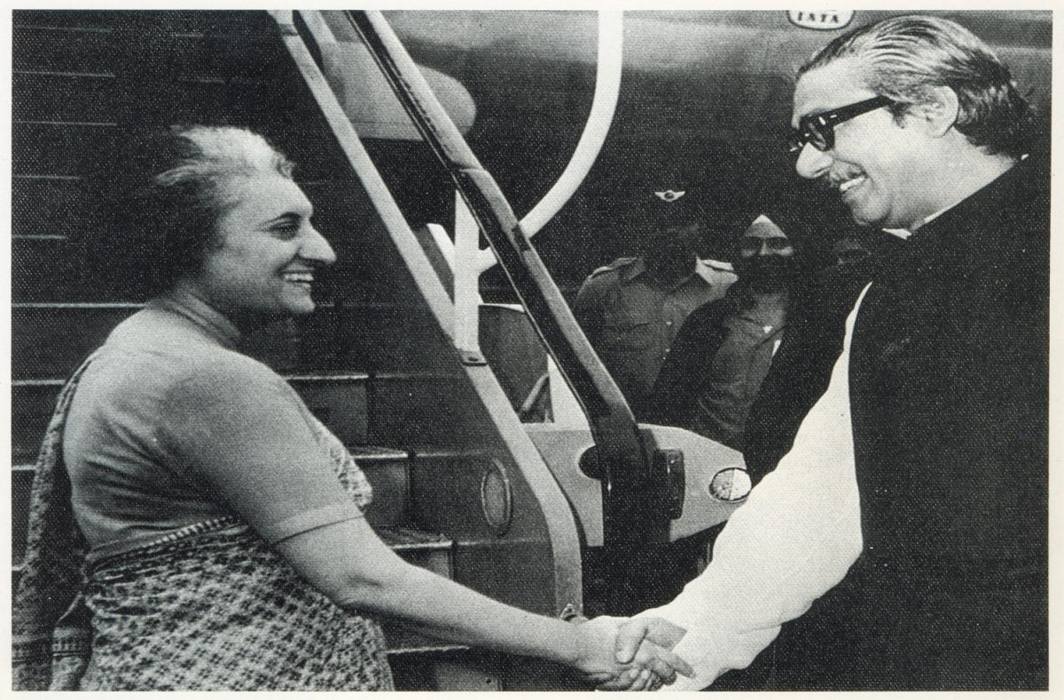
She was prepared to pay any price to save his life. This much the prime minister confided to at least one member of her so called ‘kitchen Cabinet’. That person was Ram Nath Kao.the RAW chief.
Bangabandhu, Father of the Nation, Bangladesh Prime Minister Sheikh Mujibur Rahman had twice ignored India’s alert against the bloody putsch, saying the plotters were his “own children” who will not harm him.
Over seven months before the ‘Bangabandhu’ was assassinated along with most of his family members in the August 15, 1975 carnage, a former top Research and Analysis Wing (RAW) official had met him here to warn him against the conspirators.
“These are my own children and they will not harm me,” the Bangladesh leader had told Rameshwar Nath Kao, founder of the India’s external intelligence agency, who meet him in December, 1974 with the approval of the then Indian Prime Minister Mrs. Indira Gandhi.
Referring to the book “Inside R&AW” by Asoka Raina, the report said Rahman had dismissed the concern with a wave of his hand. Kao did not argue but said the Indian information was reliable and he would send him more details of the plot.
He subsequently sent a senior RAW officer to Dhaka in March, 1975 who gave Rahman exact details of the units and ranks of the serving and dismissed officers who were hatching the plot to overthrow his post-independence government.
“But again, he (Bangabandhu) was not convinced,” it said.










I returned to Chakrata, India during the last week of January 1972 after the successful conclusion of Operation Eagle that initiated the Liberation of Bangladesh with military action in the Chittagong Hill Tracts. During February 1972, I had the opportunity to take part in the training of a National Security Force (Jatiyo Rakkhi Bahini) whose mission was very clear from the beginning. There was an utter sense of urgency and earnestness to defend the personal life of Bangabandhu Bangladesh Prime Minister Sheikh Mujibur Rahman as our intelligence information discovered a plot getting brewed by a few Bangladesh Army Officers who were not satisfied with Bangabandhu’s vision for a modern, democratic nation of Bangladesh.
In my analysis, India had prior information of the assassination plot. India diligently shared the intelligence information with Bangladesh Prime Minister. The choice to act upon the intelligence information was entirely left in the hands of Bangladesh Prime Minister. Indian Prime Minister Mrs. Indira Gandhi took utmost care to get his release from the military prison in West Pakistan and played a critical role to avoid the death sentence imposed on him. At the same time, India treated the new independent nation with grace and respect giving Bangladesh to discover its own destiny without external influence.
Rudra Narasimham Rebbapragada
Special Frontier Force-Establishment No. 22-Vikas Regiment

Jatiyo Rakkhi Bahini (JRB) – from law enforcers to Sheikh Mujib’s private army
Sheikh Mujib’s hatred for all things military
Sheikh Mujib had an understandable hatred for all things military. He had suffered grievously at the hands of Pakistan’s two military dictators, Field Marshall Ayub Khan and General Yahya Khan. Ayub had arrested Sheikh Mujib on 7 October 1958, the day he seized power. During the next 10-and-half-years of Ayub’s dictatorship Sheikh Mujib had been jailed for long periods in solitary confinement. Then in 1968, while once more in detention for political activity, he was made the principle accused in the notorious Agartala Conspiracy trial in Dhaka. The charge conspiring with India for the secession of East Pakistan. It was a capital offence and Mujib only escaped the gallows because a countryside upsurge against Ayub in 1968 forced him to drop the charges and bring Mujib to the conference table.
While a prisoner of General Yahya Khan in 1971 during the Bangladesh independence struggle, Sheikh Mujib had had an even closer brush with death. According to Sheikh Mujib, he had been tried by a military court and found guilty of treason and sedition. He was to be executed on 15 December 1971, a day before Pakistan surrendered to Bangladesh in Dhaka. Fortunately for him the ceasefire was ordered that night and he was smuggled away to safety by the prison jailor.
Sheikh Mujib carried his hatred of the army with him to the grave. This attitude was shared by his ministers and other senior Awami Leaguers who had also escaped death at the hands of the Pakistan army in 1971.To their [senior Awami Leaguers] basic hostility of things military was added, after independence, the fear that the Bangladesh army might try to supplant them. This anxiety was grounded in the fact that the Bengali military men had been in the thick of the fighting during the independence movement while the Awami Leaguers stayed safely in Calcutta out of the line of fire. As such it would have been understandable if the army men with the other freedom fighters had insisted on positions of influence in the new state. The army as an institution at least did not make this demand. It was content to let Mujib rule and in the first two years of independence gave him loyalty and support.
Anthony Mascarenhas, journalist who wrote the groundbreaking ‘Genocide’ article in 1971 & author of “Bangladesh: A Legacy of Blood” (1986)
Mujib and his ministers, however, from the very start deliberately emasculated [made efforts to weaken] the role of the Defence Forces. Before he was one month in office Mujib took the first step in this direction by signing a 25 year Treaty of Friendship and Mutual Assistance with India. The Indian army had helped to create Bangladesh and it was to India that Mujib now looked to protect it from external aggression. The treaty thus obviated the need for an effective fighting force and the country’s defence establishment was reduced to a police-keeping and largely ceremonial role.I don’t want to create another monster like the one we had in Pakistan.
Sheikh Mujib told Anthony Mascarenhas in February 1974 that he was against a powerful military force
Nevertheless, in independent Bangladesh Prime Minister Sheikh Mujib took initiatives to establish military academies for building skilled and ideal armed forces in the country. He inaugurated the Military Academy in Comilla Cantonment in 1974. However, with the administration of the country at its infancy and his personal dislike for all things military, Sheikh Mujib remained reluctant to dispense too much power to the army and maintained a cautious approach throughout his reign.When you play with gentlemen, you play like a gentleman. But when you play with bastards, make sure you play like a bigger bastard. Otherwise you will lose. Don’t forget I have had good teachers.
Sheikh Mujib allegedly remarked to Anthony Mascarenhas during a poker game on a night train from the Grand Canyon to Los Angeles
Creation of JRB
In early 1972, the government announced the formation of an elite paramilitary force named the Jatiyo Rakkhi Bahini (National Defence Force), or JRB for short. The Jatiyo Rakkhi Bahini Order, 1972 (President’s Order no. 21 of 1972) was promulgated on 7 March 1972 – on the first anniversary of Sheikh Mujib’s famous Ebarer Sangram speech – with a retroactive effect from 1 February 1972.
The idea for the JRB is believed to have resulted from a discussion between the top leaders of Mujib Bahini (also known as Bangladesh Liberation Force or BLF) and Sheikh Mujibur Rahman. The leaders made Sheikh Mujib realise that the fruit of the labour during the independence war could be undone by anti-revolutionary forces within the young volatile nation. It was a view also shared by Tajuddin Ahmad. He advised Sheikh Mujib that the 100,000 trained and armed common people that had participated as muktijuddhas (freedom fighters) during the Swadhinata Juddho (Independence War) should come under national service and a paramilitary force should be formed for them.
Sheikh Mujib was also aware of the growing threat of coup from the military. To combat these, Sheikh Mujib formed the new elite force to provide security for the people after initially rejecting the idea. The task force was formed without any consultation in the cabinet.
So about 110,000 government certified freedom fighters, at the very outset of the independence, felt ignored and excluded from the reconstruction of the new country. Though Sheikh Mujib offered the freedom fighters to join the armed forces, only 8,000 turned up – mostly young Mujib Bahini members and other loyal cadres – and they were absorbed in the Jatiyo Rakkhi Bahini.
Indian link
Jatiyo Rakkhi Bahini was actively deployed just after the Indian Army left Bangladesh on 17 March 1972. The force was trained and brought up by Indian Major General Sujan Singh Uban from Research and Analysis Wing (RAW) as per the request of Sheikh Mujibur Rahman. General Uban, had also trained the Mujib Bahini in India during the 1971 Bangladesh Liberation War and accompanied Sheikh Moni to Bangladesh.
The basic training of the force was not provided by the Bangladesh Army but instead given in India, by Indian Army. Any additional special training were also provided by India in the Indian Military Academy of Dehradun. The JRB troops were armed with Indian assault rifles, heavy machine guns, steel helmet, and leather boots. Jeeps and trucks were imported from India and their olive green-coloured uniform was similar to that of the Border Security Force 66 of the Indian Army.
The JRB was led by Brigadier General A. N. M. Nuruzzaman who was appointed as the Director General while Major Anwarul Alam Shahid (Training), Lieutenant Colonel Abul Hasan Khan (Administration), Lieutenant Colonel Sarwar (Operations), Lieutenant Colonel Sabihuddin (Signals) and Lieutenant Colonel Azizul Islam (Zonal Head Quarter of Chittagong) were his five deputies.
Brigadier Nuruzzaman was a Sector 3 (Brahmanbaria and parts of Sylhet) Commander during 1971 Liberation War.The raising of a new paramilitary force, JRB having exclusive allegiance to Sheikh Mujib proved morally and politically disastrous. JRB became the target of anti-Mujib campaign.
At the height of its influence in 1975 JRB was 25,000 member strong and plans were put in place for it to grow to an astronomical 130,000 by the end of 1980 – that’s more than the number of muktijuddhas who fought in the Swadhinata Juddho. These troops would have been distributed to every district under the authority of the 60 District Governors. To finance this force, Sheikh Mujib used the major part of the 13% of public expenditures allocated to defence, and recruitment of new soldiers in the army was almost stopped. When the Rakkhi Bahini was raised to 25,000 men with basic military training and modern automatic weapons, the discontent amongst some army men turned into antagonism. All these discrimination created rift between the two forces.The Jatiyo Rakkhi Bahini, which roughly translated means National Security Force, was an elite para-military force whose members had to take oaths of personal loyalty to Bangabandhu Sheikh Mujibur Rahman.


